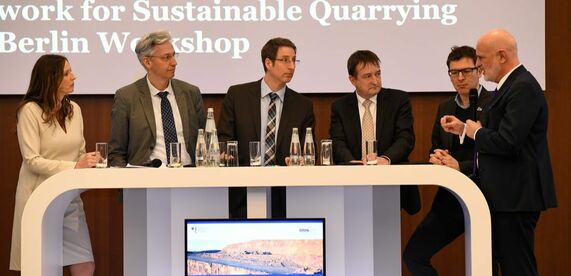Raw materials supply:
Policy-makers and experts discuss practices and perspectives for sustainable mineral extraction
Representatives from German and EU policy-makers, extractive industries, social partners, environmental and academic organisations agreed on the importance of raw material supply and supported dialogue to ensure sustainable and reasoned quarrying and mining practices.
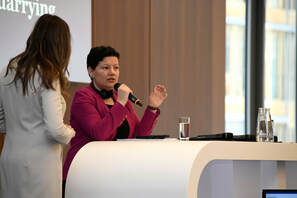 Dr. Aurela Shtiza
Dr. Aurela Shtiza
Berlin, 7 March 2019
The German Building Materials Association (bbs) organised a workshop on sustainable perspectives for raw material extraction in Germany and Europe, which took place in Berlin on 7 March 2019. The event, which was moderated by the journalist Kristina zur Mühlen, gathered a hundred participants among German and European decision-makers, academia, industry and other stakeholders with a strong interest in a reasoned and sustainable access to raw materials.
The workshop was part of the European Network on Sustainable Quarrying and Mining (ENSQM), a Raw Material Commitment under the European Innovation Partnership. Dr. Aurela Shtiza, a Director at the Industrial Minerals Association Europe, presented this network endorsed by the European Commission in 2016 and aimed at boosting sustainable mining and quarrying at national level through a culture of cooperation among stakeholders. The ENSQM involves extractive industry associations at EU, national and regional level, as well as public and educational institutions.
The German Building Materials Association (bbs) organised a workshop on sustainable perspectives for raw material extraction in Germany and Europe, which took place in Berlin on 7 March 2019. The event, which was moderated by the journalist Kristina zur Mühlen, gathered a hundred participants among German and European decision-makers, academia, industry and other stakeholders with a strong interest in a reasoned and sustainable access to raw materials.
The workshop was part of the European Network on Sustainable Quarrying and Mining (ENSQM), a Raw Material Commitment under the European Innovation Partnership. Dr. Aurela Shtiza, a Director at the Industrial Minerals Association Europe, presented this network endorsed by the European Commission in 2016 and aimed at boosting sustainable mining and quarrying at national level through a culture of cooperation among stakeholders. The ENSQM involves extractive industry associations at EU, national and regional level, as well as public and educational institutions.
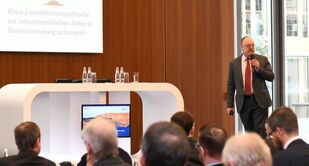 Dr. Thomas Gäckle
Dr. Thomas Gäckle
While better production processes and circular models can help our economies to be more resource efficient, mineral extraction remains and will continue to be of utmost economic importance for Germany and Europe over the long term. In the context of an update to the German Raw Materials Strategy, Dr. Thomas Gäckle, from the German Federal Ministry of Economic Affairs, used the example of gypsum to stress the importance of allowing sustainable extractive activities: The phase-out of coal power plants will reduce the production of synthetic gypsum from flue gas desulphurisation, which needs to be compensated.
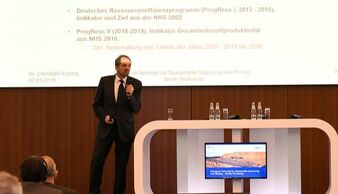 Dr. Christoph Epping
Dr. Christoph Epping
Facilitating recycling of construction and demolition materials is an important element of answer, as pointed out by Dr. Christoph Epping, from the German Federal Ministry of the Environment. But this will not be enough. Hence, the access to domestic raw materials will be necessary. How to ensure the needed extractive activities are sustainable?
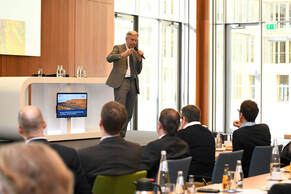 Stefan Leiner
Stefan Leiner
The European Union has played a major role in passing key legislation on nature and species protection, e.g. Natura 2000, the Birds and Habitats Directives. Some of these acts and the overall EU Biodiversity Strategy are currently being reviewed, along with guidance documents, said Stefan Leiner, Head of Unit for Biodiversity in the Commission’s Directorate-General for the Environment. Dialogue with industry and other stakeholders is crucial here. Further activities on biodiversity are going on within United Nations and the G7.
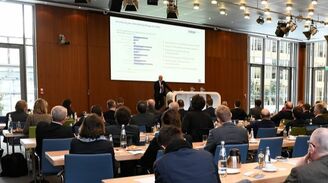 Michael Basten
Michael Basten
Raw materials extraction is a major economic driver for Germany, where 71% of the supply comes from domestic sources. A comprehensive study by bbs, shortly introduced by Michael Basten, the German Building Materials Association’s Managing Director, looks at the status and perspectives of raw materials supply in Germany. It shows a substantial decoupling between construction sector investments and raw material supply. But the demand for raw materials will likely remain stable or grow until 2035. In parallel, the sector achieves a significant 90% recovery quote for mineral building waste.
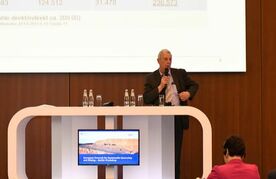 Franz-Gerhard Hörnschemeyer
Franz-Gerhard Hörnschemeyer
Ensuring stable and sustainable raw material extractive activities in Germany is also in the interests of local industry value chains, the German economy and the qualified labour force, as the trade union IG BCE’s representative Franz-Gerhard Hörnschemeyer underlined. “Cultural landscapes” are important to maintain, along with natural landscapes.
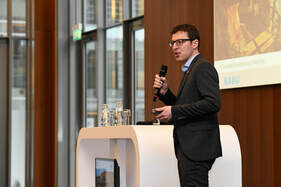 Johannes Enssle
Johannes Enssle
Representing the environmental organisation NABU for Baden-Wurttemberg, Johannes Enssle reflected on the complexity of ensuring a balanced raw material supply policy. He used concrete examples to demonstrate the value of cooperation among actors from industry, NGOs, social partners, academic and public authorities, to promote biodiversity in quarrying and mining.
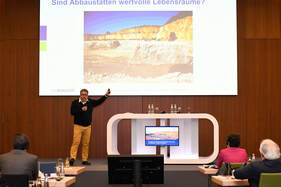 Prof. Dr. Michael Rademacher
Prof. Dr. Michael Rademacher
Prof. Dr. Michael Rademacher, from TH Bingen University, echoed this plea, calling such a cooperation the key to success for extractive industry companies. He rejected a static vision of biodiversity, stressing that quarrying and mining activities can generate dynamics in natural landscapes – which can also be positive for ecosystems. He pointed out the need to have a good project management, to understand every partner’s interests and to allow for flexible readjustments, in order to achieve truly sustainable practices.
Joined in a panel discussion by Norbert Conrad, from Lower Saxony’s Ministry of Economic Affairs, and Dr. Stefan Lütkes, from the Federal Ministry of the Environment, the speakers exchanged views on the legal aspects of nature protection in quarries.
Participants considered it useful to better understand the local realities on extraction sites and to raise awareness about these achievements in order to overcome regulatory obstacles. Future events could be helpful to take stock on progress.

